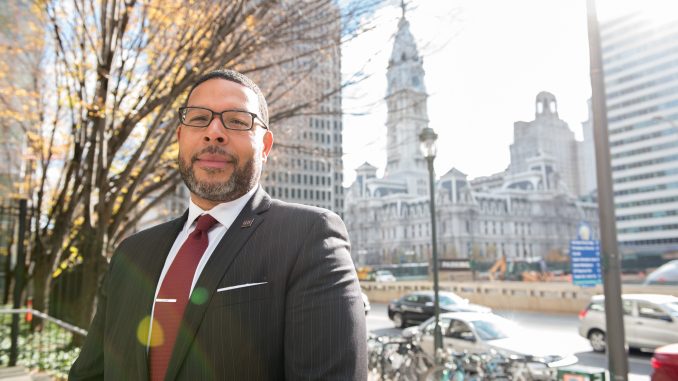
School never came easy for Otis Hackney, but struggling as a student gave the “kid from 56th Street” a deeper appreciation for education.
Now, the 1998 secondary education and mathematics alumnus is the chief education officer for the City of Philadelphia.
Hackney was appointed by Mayor Jim Kenney last year after he successfully transformed South Philadelphia High School — a school that made national headlines in 2010 due to racial violence among students — into a “community school” during his time as principal.
During the rest of his first term as the chief education officer, he said he will create 25 more community schools, which double as hubs within the community to provide families with resources. He also hopes to open 2,000 new pre-kindergarten seats for Philadelphia children.
“Our children have challenges that negatively impact their learning every day,” Hackney said. “If we figure out ways to diminish some of those barriers for children, then they can focus on learning, teachers can focus on teaching, principals can focus on supporting teachers and students.”
One way to accomplish this is by providing resources like social services, health information and recreational opportunities to both children and their families in order to engage students and the community with their school, he said. Hackney and his team send surveys to families to gauge their wants and needs for their schools
“Those things could be helping social, emotional needs, expanding learning opportunities, after-school programs, but also seeing them as a center within a community to provide access to different programs to support children and families with different services that they ask for or need,” Hackney said.
“But it’s a process,” he added. “It’s not something that you do overnight. It’s something that you do by learning to engage the community.”
Hackney said the community schools instill a new sense of pride and engagement in the school that leads to a better environment for students and teachers, higher attendance rates, lower suspension rates and often better grades.
Hackney said he didn’t get the best grades in school, which helped him relate to students when he was a math teacher and basketball coach at Germantown High School, and later the principal of South Philadelphia High School.
Most teachers he has worked with were once excellent students, he said, so it’s hard for many teachers to understand students who aren’t engaged. They often write them off instead of trying to relate to the barriers that may affect their learning.
“[But my teaching style was] being the kid that wasn’t much different than some of the kids in the classroom,” he said. “You can do some of those things you want to do as a kid — not all of them, but some — and still be educated and smart.”
Tionna Miller, one of Hackney’s former students and basketball players at Germantown High School, is now his assistant in the Mayor’s Office. She said Hackney always protected his students as though they were his own children.
“He comes in and he checks on everyone,” she said. “Even though we should be the ones checking on him.”
Miller and Hackney lost touch after she graduated, but they reconnected just as Hackney was looking for a new assistant. Miller said she feels just as supported as his employee as she did when she was his student.
“I feel like this position has allowed him to flourish,” Miller said. “It involves the community and the children.”
After dropping out of Hampton University in southern Virginia, Hackney returned home and began installing heating systems for his father’s business and taking classes at the Community College of Philadelphia.
He said he “really hit [his] stride” when he transferred to Temple.
“I didn’t always get the highest grade in the class, but I was ready to be a student,” he said. “There were gaps in my learning, so I had to learn information that I should have learned back in high school. Sometimes I don’t know how I got through. I had no idea how hard it was, I was just doing it.”
His professors at Temple challenged him and cared about his success, he said, which he didn’t expect to find at a big school. By the time he got to Temple, he knew he “wanted to be a teacher and needed to help other people in the city to appreciate education.”
“Growing up, it wasn’t anything I ever thought I could do,” he said. “I just want kids to know how much it can change your situation. One way that’s not a guarantee but definitely increases your chances is just getting your education.”
“You might not be able to change your childhood,” he added, “but you can definitely change your adulthood.”
Erin Moran can be reached at erin.moran@temple.edu or on Twitter @ernmrntweets.



Be the first to comment